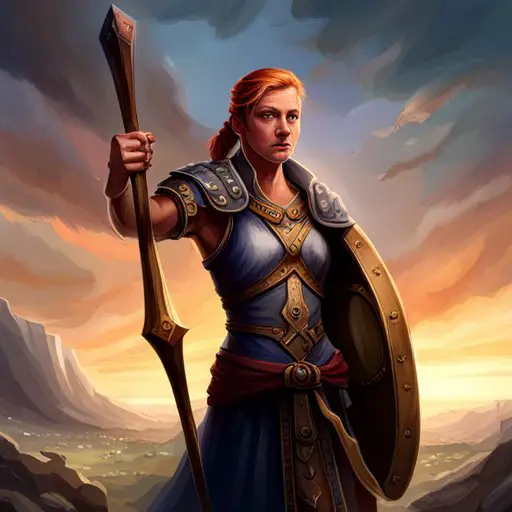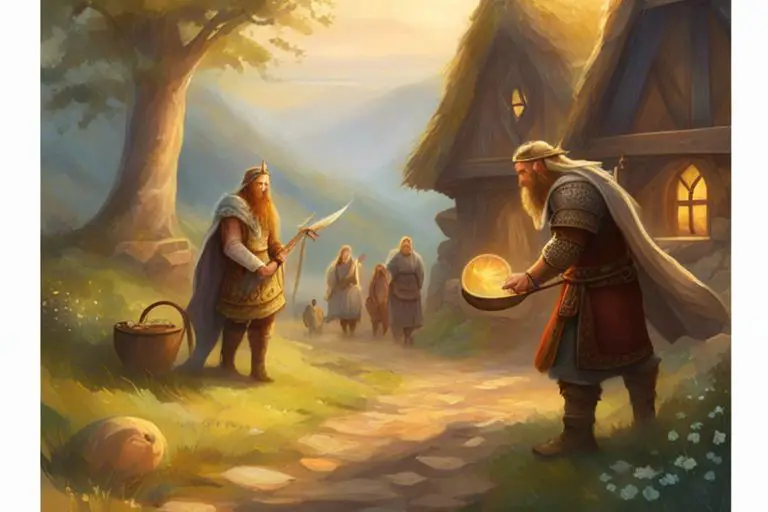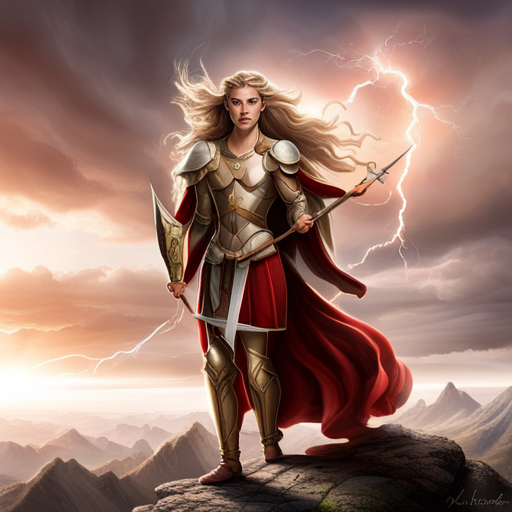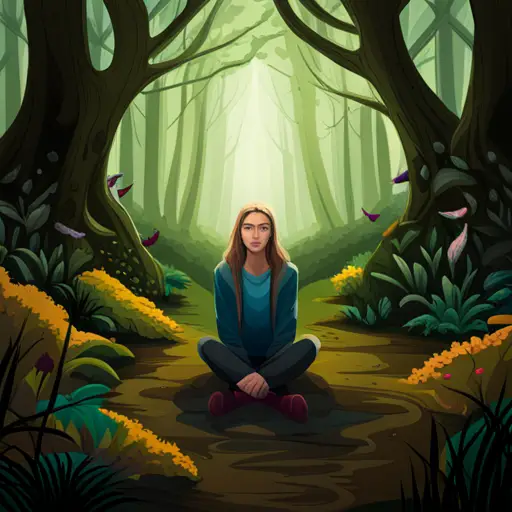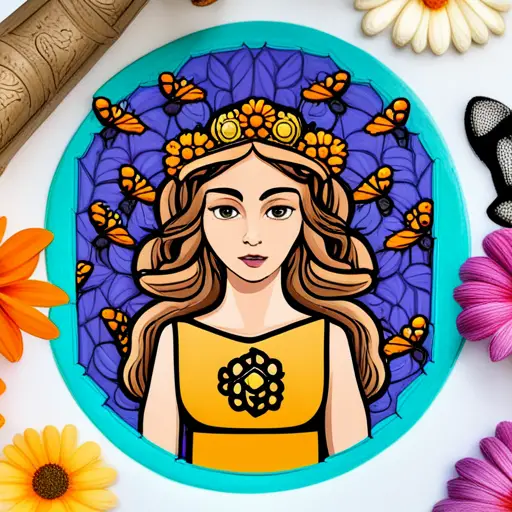Did you know that Baldur, one of the most beloved gods in Norse mythology, was betrayed and murdered by his own brother?
It’s a tragic tale that explores themes of love, betrayal, and the inevitability of fate. As someone who has always been fascinated by mythology, I was immediately drawn to the story of Baldur and the impact his death had on the Norse gods and their world.
In this article, we’ll delve into the story of Baldur’s death and what it represents in Norse mythology. We’ll explore the characters involved in the plot to murder him, as well as the themes of love and betrayal that run throughout the tale.
Finally, we’ll examine the significance of Baldur’s death and how it shaped the beliefs and practices of the ancient Norse people.
So, let’s dive in and explore this tragic and captivating story together.
The Beloved Son of Odin and Frigg
The section explores the tender relationship between Odin, Frigg, and their cherished son. Baldur was the favorite son of the Allfather and the Queen of Asgard. He was known for his beauty, wisdom, and kindness.
His parents loved him dearly, and he reciprocated their affection by being a dutiful and respectful son. Baldur was the epitome of perfection, and his presence brought joy and peace to his family. Odin and Frigg were proud of their son’s accomplishments and attributes.
They knew that he was destined for greatness and that he would become a worthy successor to the throne of Asgard. Baldur’s presence was a source of comfort and inspiration to his parents, who cherished every moment spent with him.
However, their happiness was short-lived, as a dark cloud loomed over their family. The plot to murder Baldur was about to unfold, and it would shatter their lives forever.
The Plot to Murder Baldur
You’re about to witness a dark scheme unfold, as the gods’ jealousy seeps in like a poison ivy, suffocating the light of hope.
The story of Baldur’s death is a tale of betrayal and tragedy that still resonates with us today.
The gods were envious of Baldur’s beauty, kindness, and his close relationship with his mother, Frigg.
Odin, the Allfather, decided to test Baldur’s invincibility by sending him to the underworld, but Frigg made all things promise not to harm him.
Loki, the trickster god, found a loophole in Frigg’s plan.
He disguised himself as an old woman and asked her if she had made all things swear not to harm Baldur.
Frigg replied that she had not asked the mistletoe, as it was too young and insignificant to harm her son.
Loki then made a spear from mistletoe and gave it to Baldur’s blind brother, Hodr, who unknowingly threw it at Baldur, killing him instantly.
The gods were devastated and tried to bring Baldur back to life, but it was too late.
Themes of Love and Betrayal
It’s impossible not to feel the weight of heartbreak and deception within the tale of the gods’ envy and the consequences of their actions.
The story of Baldur’s death is a tragic one that speaks of the power of love and the depths of betrayal.
Baldur was loved by all, but his own mother, Frigg, feared for his safety and went to great lengths to ensure his protection.
She asked all things in the world to swear not to harm him, but one small mistletoe sprig was overlooked.
Loki, the god of mischief, used this oversight to trick Baldur’s blind brother, Hod, into throwing the mistletoe at Baldur, killing him instantly.
This act of betrayal was not only a betrayal of Baldur, but of all the gods who had sworn to protect him.
The pain and sorrow that followed Baldur’s death is a reflection of the deep love and respect the gods had for him, and the devastating consequences of betrayal.

The Inevitability of Fate
Inevitability of fate is a prominent theme throughout the story, as the gods’ attempts to prevent Baldur’s demise ultimately led to his downfall. Despite their efforts, it was foretold that Baldur would die, and the gods’ actions only served to speed up the process.
This sense of inevitability is palpable throughout the story, as the gods try to do everything in their power to prevent Baldur’s death, but ultimately fail. This theme of inevitability is a common thread throughout Norse mythology, as fate plays a central role in the lives of the gods and mortals alike.
In the case of Baldur, his death was not only inevitable, but also served as a catalyst for the events that would ultimately lead to Ragnarok, the end of the world. This sense of fate and inevitability is a key aspect of Norse mythology, and serves to remind us of the importance of accepting our own mortality and the limits of our power.
Significance in Norse Mythology
The significance of fate in Norse mythology cannot be overstated, as it serves as a constant reminder of the power of destiny and the inevitability of the future.
The Norse gods and goddesses believed that fate was a force that couldn’t be changed, and that even they were subject to its whims.
This is seen most clearly in the story of the death of Baldur, where Odin, Thor, and the other gods and goddesses were unable to prevent Baldur’s death, despite their best efforts.
The story of Baldur’s death is a tragedy that serves as a cautionary tale about the dangers of betrayal and the consequences of actions.
The betrayal of Loki, who tricked Baldur’s blind brother Hod into killing him with a mistletoe dart, is seen as a symbol of the chaos and destruction that can result when trust is broken.
The story also serves as a reminder that even the gods aren’t immune to fate, and that all actions, no matter how good or well-intentioned, can have unintended consequences.
In this way, the story of the death of Baldur continues to resonate with readers today, reminding us of the power of fate and the importance of making choices that align with our values and beliefs.
Frequently Asked Questions
What was Baldur’s occupation or role in Norse mythology?
As a fan of Norse mythology, I can tell you that Baldur was one of the most beloved gods in the pantheon. He was the god of light, beauty, and purity. He was also known for his kindness, his wisdom, and his ability to bring people together.
In many ways, he was the epitome of what a god should be. However, his role in the mythology was not limited to just one aspect. He was also a warrior, a healer, and a diplomat. He was a leader among the gods, respected and revered by all.
It’s said that his death marked the beginning of the end for the Norse gods, and that his absence was felt deeply by all those who knew him. As the saying goes, “The brightest stars burn the fastest,” and Baldur was certainly one of the brightest stars in the Norse sky.
Who were Baldur’s siblings and what were their relationships like?
Baldur was the son of Odin and Frigg, and he had several siblings in Norse mythology.
Thor was his half-brother and was known for his strength and bravery.
Loki was also a half-brother of Baldur’s, but their relationship was complicated as Loki was known for his trickery and often caused trouble for the other gods.
Baldur’s other siblings included Hod, Hermod, Bragi, Vali, and Tyr.
Overall, the relationships between Baldur and his siblings were complex, shaped by their individual personalities and circumstances.
As a reader, I’ve found it interesting to learn about the dynamics between these mythological characters and the influence they had on each other’s stories.
How did the other gods react to Baldur’s death?
When I learned about Baldur’s death, I couldn’t believe it. My heart sank as I realized the impact it would have on the other gods.
It was a tragic loss, and many of us were devastated. Some were angry and seeking revenge while others were overwhelmed with grief.
As the news spread, we all struggled to come to terms with the reality of what had happened. It was a time of great turmoil and betrayal, and it took a long time for the wounds to heal.
But even in the midst of such darkness, we came together as a community to mourn and support one another.
Were there any attempts to revive Baldur after he was killed?
I found it interesting to learn that despite the gods’ grief over Baldur’s death, there were attempts to revive him.
According to Norse mythology, the goddess Hel agreed to release Baldur from the underworld if every creature in the world wept for him.
While many creatures did weep, a giantess named Thokk refused to do so, and Baldur remained dead.
This shows that even in the face of tragedy, there’s always hope and the possibility of redemption.
Did Baldur have any romantic relationships or children?
To the best of my knowledge, Baldur didn’t have any romantic relationships or children.
While he was highly respected and admired by both gods and mortals alike, there is no mention of him being romantically involved with anyone in Norse mythology.
Baldur was described as being fair and beautiful, but he was also known for his purity and innocence.
It’s possible that his devotion to his duties and his reputation as a noble and just god left him with little time for romantic pursuits.
Regardless, Baldur’s tragic death at the hands of his own brother, Loki, left an indelible mark on Norse mythology and continues to be one of its most enduring tales.
Conclusion
In conclusion, the story of Baldur’s death is one of the most tragic tales in Norse mythology. As a son of Odin and Frigg, Baldur was loved by all. However, his life was cut short by a cruel plot hatched by Loki and his accomplices.
The themes of love and betrayal are prevalent throughout the story, reminding us of the fragility of trust and the power of jealousy. Despite the efforts of the gods to prevent his death, fate proved to be an unstoppable force. The inevitability of Baldur’s fate is a reminder that even the most powerful beings are subject to the whims of destiny.
This tragic tale serves as a cautionary tale about the dangers of allowing hatred and envy to take hold in our hearts. It also reminds us of the importance of cherishing our loved ones and treasuring the time we have with them.
As we reflect on the story of Baldur’s death, we must ask ourselves: are we willing to let jealousy and hatred consume us, or will we choose to cherish and protect the ones we love? The answer to this question may determine our own fate, just as it did for Baldur.
Let us learn from his story and strive to live our lives with love and compassion.

